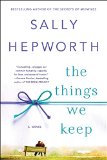Summary | Excerpt | Reading Guide | Discuss | Reviews | Beyond the Book | Read-Alikes | Genres & Themes | Author Bio

Critics' Opinion:
Readers' Opinion:
First Published:
Jan 2016, 352 pages
Paperback:
Jan 2017, 352 pages
 Book Reviewed by:
Book Reviewed by:
BookBrowse First Impression Reviewers
Buy This Book
This article relates to The Things We Keep
"Dementia in its varied forms is not like cancer, [which is] an invader. But Alzheimer's is me, unwinding, losing trust in myself, a butt of my own jokes and on bad days capable of playing hunt the slipper by myself and losing. You can't battle it, you can't be a plucky "survivor". It steals you from yourself."
This is author Terry Prachett, in a 2008 article for the Alzheimer's Society (reprinted by The Guardian in 2015). Pratchett wrote this shortly after he was diagnosed with posterior cortical atrophy or PCA (which depending on which specialist you talk to is either a form of Alzheimer's or closely related to it). It causes a deterioration of memory, plus a loss of visual acuity, but allows for retention of fluency and coherence. In other words, you can kind of fake that you are perfectly okay. Pratchett was told that it is "the best form of Alzheimer's to have" - a comment he found somewhat moot.
But of course you aren't okay, with this or any other form of Alzheimer's. Early-onset Alzheimer's disease, which is the subject of Sally Hepworth's newest novel, The Things We Keep, is, at its simplest definition, Alzheimer's disease that affects people under the age of 65. Just about 4% of the 5 million people in the USA who have Alzheimer's have the early-onset form. While doctors don't know why some instances of early onset happen, scientists have isolated rare genes that can directly cause it in a many cases. This is called "familial Alzheimer's disease" and it can affect many generations of family members. While early-onset Alzheimer's looks, for all intents and purposes, like regular Alzheimer's (in terms of symptoms, rate of decline and assistance needs, etc.) it can bring a whole host of other issues to light due to the stage of life the person - and families - are in. So, for instance, someone in her 40s who gets early-onset Alzheimer's might still have young children, or might have a full time job. How does that person explain her condition to her children? How does she plan for when she can't communicate with them? How does that person alter her job so that it is manageable? How does she maintain her standard of living if she has to reduce hours or leave her employment? These, and many other questions, are very specific to someone with early-onset Alzheimer's.
An April 2015 blog post at alzheimer's.net, discusses a drug that is bringing hope to people with early onset Alzheimer's. Able to slow cognitive decline, BIIB037, or aducanumab, works by "reducing amyloid plaques in the brains of people with dementia." (Amyloid is a protein found naturally in the body but in people with Alzheimer's, the protein divides in an unusual way which creates a sticky build-up that gathers along nerve cells.) In a study of 166 people, those who took the highest doses of BIIB037 had the largest reduction of amyloid plaque and even reversed their cognitive decline. Although this is a small study, the biotech firm (Biogen) is cautiously optimistic and hopes to conduct a larger test on 1000 people.
This does not help Terry Pratchett who died in March 2015. But he would be pleased. Here is more from his 2008 article.
"What is needed is will and determination. The first step is to talk openly about dementia because it's a fact, well enshrined in folklore, that if we are to kill the demon, then first we have to say its name. Once we have recognized the demon, without secrecy or shame, we can find its weaknesses. Regrettably, one of the best swords for killing demons like this is made of gold — lots and lots of gold. These days we call it funding.
I believe the D-day battle on Alzheimer's will be engaged shortly and lots of things I've heard from experts strengthen that belief. It is a physical disease, not a mystic curse; therefore it will fall to a physical cure. There's time to kill the demon before it grows."
Filed under Medicine, Science and Tech
![]() This "beyond the book article" relates to The Things We Keep. It originally ran in January 2016 and has been updated for the
January 2017 paperback edition.
Go to magazine.
This "beyond the book article" relates to The Things We Keep. It originally ran in January 2016 and has been updated for the
January 2017 paperback edition.
Go to magazine.





The Flower Sisters
by Michelle Collins Anderson
From the new Fannie Flagg of the Ozarks, a richly-woven story of family, forgiveness, and reinvention.

The House on Biscayne Bay
by Chanel Cleeton
As death stalks a gothic mansion in Miami, the lives of two women intertwine as the past and present collide.

The Funeral Cryer by Wenyan Lu
Debut novelist Wenyan Lu brings us this witty yet profound story about one woman's midlife reawakening in contemporary rural China.
Your guide toexceptional books
BookBrowse seeks out and recommends the best in contemporary fiction and nonfiction—books that not only engage and entertain but also deepen our understanding of ourselves and the world around us.